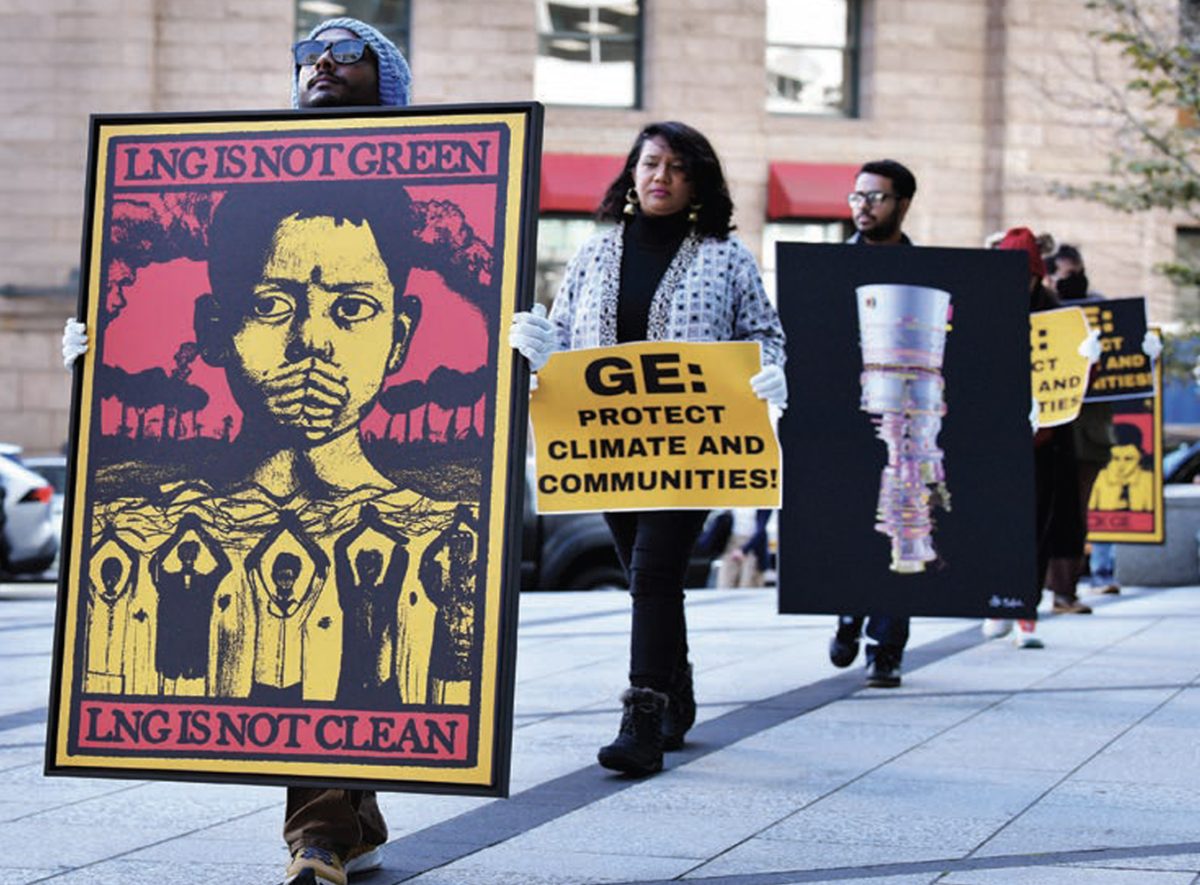On Oct. 25, notable Bangladeshi artists collaborated with a group of climate activists endeavored to deliver artwork to General Electric offices in Boston, MA, in a manner marked by civility to protest. However, security prevented the artists and activists from gaining entry.
This group was comprised of representatives from Market Forces, an Australian NGO devoted to diverting finance and investment away from environmentally harmful activities.
The Glasgow Actions Team formed around the United Nations Climate Conference in 2021, whom of which is committed to pushing the world’s climate champions to go further, and the AP Images participated as well.
These artist and activist groups have been imploring major investors to closely examine the actions of the fossil fuel giants, especially in light of GE company’s rebranding as “GE-Vernova,” with promises of providing “sustainable energy” which came after the announcement of GE’s power sector separation. Concurrently, GE persists in heavy investments in colossal fossil fuel projects in Vietnam and Bangladesh!
Art serves as the voice of this climate protest, with paintings and original artworks purposefully created to underscore the detrimental impacts of GE’s fossil fuel pursuits.
Ata Mojlish, a Bangladeshi artist and climate activist stressed “the consequences of GE’s fossil fuel projects go beyond humanity’s future. There are immediate impacts on the livelihoods of humans and animals, erasing identities, cultures and histories. With this artwork, we’re reminding GE’s investors to urgently reconsider their stake in GE’s polluting projects.“
In the Chattogram region of Bangladesh alone, power projects involving GE’s liquefied natural gas would introduce roughly 430 million tonnes of carbon dioxide equivalent into the atmosphere over the plant’s operational lifespans. This is nearly double Bangladesh’s annual national emissions.
Bangladesh contributes minimally to global fossil fuel emissions, yet it is disproportionately affected as a low-lying country susceptible to rising sea levels and devastating cyclones. Bangladeshi communities are increasingly alarmed and are incensed by GE’s proposals for liquefied natural gas power plants, which would bind the country to decades of polluting fossil fuels.
“Bangladesh, a country with its unique cultural tapestry and vibrant heritage, is an embodiment of resilience and strength. Yet, it finds itself precariously positioned on the outskirts of the global power landscape, where decisions are often made far removed from its own voices and aspirations,” said Artist Debashish Chakrabarty. “I would like to ask those people, who live in the centers of the global power landscape and have the right to speak, to ask GE about their greenwashing.”
Given its standing as one of the world’s leading wind turbine manufacturers, ranking fifth globally for additional commissioned wind capacity in 2021, GE has the capacity to transition to wind energy.
The Boston movement was followed by an exhibition titled “Electric Bangladesh: Fossil Free Futures,” curated by Zaid Islam, showcasing works of Monica Jahan Bose, Debashish Chakrabarty, Morshed Mishu, Ata Mojlish and AFM Moniruzzaman Shipu at Cambridge Foundry near GE headquarters in Boston.
The resilient curator Islam wrote in his note, “this is a tiny effort to draw the attention of stakeholders to GE Vernova. WE SEE YOU!”
This movement is a speck of hope for future collaborations of conscious citizens including Schoolcraft students in understanding the environmental hazards associated with greedy company’s fossil-fuel-profit ventures.
Original source and for more information: https://mailchi.mp/glasgowactions/boston-bangladesh-action.









